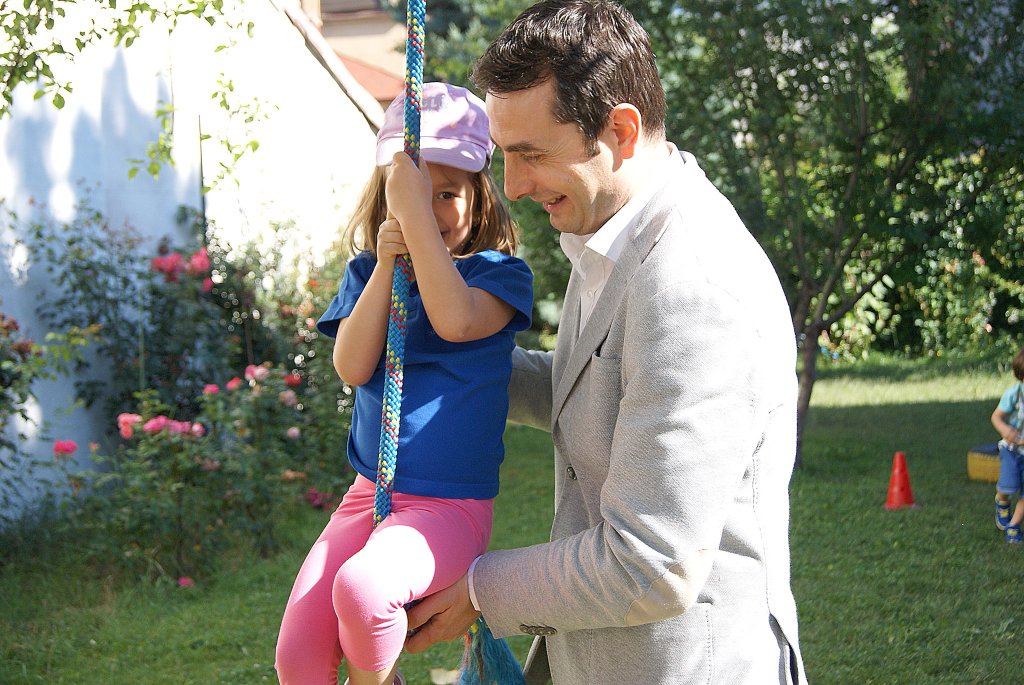 How often do you hug your child? How do you show him that you love him? How much time do you give him from your busy schedule?
How often do you hug your child? How do you show him that you love him? How much time do you give him from your busy schedule?
We all live busy, stressful lives and have countless concerns as parents, but one of the most important things we need to do is to stop and give our children a big hug. And then another.
For our children, love, the time we dedicate to them and the feeling of security are intertwined, and the best way to love them is to make them feel important, safe and cared for.
Today we talk about why it is important to show them how much we love them and how to do it in a healthy and relevant way for their development.
Why is it important to show them love?
Research over the past decade has highlighted the link between the affection that we give to our children in their early years and the health and happiness of the adult they become. Science claims that the affection and warmth expressed by parents towards their children results in positive lifelong results for these children, according to Child Trends (the leading nonprofit research organization in the United States, focused on improving the lives and prospects of children, youth, and their families).
In 2010, researchers at Duke University Medical School showed that babies with very affectionate and caring mothers were more likely to become happier, more resilient, and less anxious adults. The study involved about 500 people who were followed from infancy to the age of 30.
 When babies were eight months old, psychologists observed their mothers’ interactions with them and assessed their mother’s level of affection and attention on a scale of 1 to 5. Nearly 10% of mothers showed a low level of affection, 85% showed a normal amount of affection and about 6% showed a high level of affection.
When babies were eight months old, psychologists observed their mothers’ interactions with them and assessed their mother’s level of affection and attention on a scale of 1 to 5. Nearly 10% of mothers showed a low level of affection, 85% showed a normal amount of affection and about 6% showed a high level of affection.
Thirty years later, the same people were interviewed about their emotional health and it was found that adults, whose mothers showed high or normal affection, were less likely to feel stressed and anxious. Also, the likelihood of hostile feelings, disturbing social interactions, and negative psychosomatic symptoms was much lower.
Higher self-esteem, academic performance, better parent-child communication and fewer psychological and behavioral problems were associated with this type of affection. On the other hand, children who did not have loving parents tended to have lower self-esteem and felt more alienated, hostile, aggressive, and antisocial.
How do you reconcile your career with the affection that children need?
 If you are a parent who values career, you are probably facing the challenge of finding work-life balance. Here comes the concern of early childhood education experts about parents failing to give their children enough time, guidance, and affection in their attempt to give them a secure future.
If you are a parent who values career, you are probably facing the challenge of finding work-life balance. Here comes the concern of early childhood education experts about parents failing to give their children enough time, guidance, and affection in their attempt to give them a secure future.
We might think that a room full of beautiful toys, enrollment in a prestigious nursery or school, or gifts are enough evidence of the love we have for our children. But children cannot understand this because their love language is different. They need affection and direct interaction with their parents, who can make them feel appreciated, by teaching them to recognize, accept and value their emotions. Only in this way can we manage to give our children confidence in themselves and in life.
In Acorns Nursery, we believe in the power of gentle education and know how important it is for little ones to feel that special love and affection at home. That’s why we want to share with you the most important ways you can show your love to your children in a healthy way, even when you have a very busy schedule
- Use supportive, gentle, kind words that reassure your child that you trust and value him.
- Encourage him to express himself. Look them in the eye and listen to their words. Children know when you’re distracted and this makes them feel unimportant to you.
- Create the physical contact that they need so much – hugs, kisses, and any other positive, loving touches that create a sense of security and belonging
- Give him small gifts, any thing or gesture, no matter how small, to let him know that you are thinking about him, and you are important to him.
- Spend quality time together doing things your child enjoys doing.
- Create fun traditions. It doesn’t have to be expensive or time consuming. For example, you can explore a new park every month or cook together every Saturday morning.
- Help your child with the tasks he needs help with so that he feels that he is not alone and can count on the adults around him that love him.
- Accept, appreciate, and encourage your child’s passions – thus helping him to feel supported. Moreover, if you take part in his favorite activities, you show him that it is important enough to devote your time to what he loves.
- Don’t focus on mistakes. Help your child understand that mistakes are part of our lives, especially when we are learning. And it is important that we draw constructive conclusions from mistakes, rather than to be hindered by them.
- Thank him and compliment him. Do it more often in front of other friends and family, not only do you help your child feel loved and appreciated, but you build his self-confidence. This can also help him to repeat the praised behavior.
- Keep your promises. If you regularly break your promise, your child may end up seeing you as unreliable, unpredictable, and insecure.
- Say “I love you” to your child. NOW is always the perfect time to tell your child that you love him, you don’t need a special occasion and it’s never too much.
We conclude with one last piece of advice and perhaps the most important one. Be present, even if you are a busy parent. Studies show that there are nine minutes during the day that have the greatest impact on a child:
♥ The first three minutes after they wake up
♥ Three minutes after arriving home from nursery or school
♥ The last three minutes of the day – before going to bed.
Try as much as possible to be present in these 3 extremely important moments for him.
